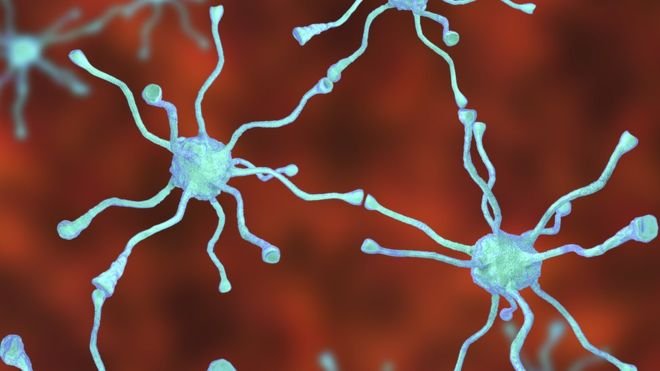
Scientists believe they have found a way to treat and perhaps reverse Parkinson's disease, by making replacement cells to mend the damaged brain.
They say human brain cells can be coaxed to take over the job of the ones that are destroyed in Parkinson's.
Tests in mice with Parkinson-like symptoms showed that the therapy appeared to ease the condition.
Many more studies are needed before similar tests can begin in people.
Experts say the research published in Nature Biotechnology is hugely promising, although at a very early stage.
The scientists still have to check if the treatment is safe, and whether the converted cells, which started out in life as astrocytes, can truly function like the dopamine-producing neurons lost in Parkinson's.
Parkinson's disease
People with Parkinson's lack enough dopamine because some of the brain cells that make it have died.
It is not known what kills the cells, but this loss causes debilitating symptoms, such as tremor and difficulty in walking and moving.
Doctors can prescribe drugs to help manage the symptoms, but cannot treat the cause.
Scientists have been looking for ways to replace the damaged dopamine neurons by injecting new ones into the brain.
The international team of researchers who carried out the latest work, however, used a different approach that does not require a cell transplant.
They used a cocktail of small molecules to reprogramme cells already present in the brain.
When they mixed a sample of human astrocytes with the cocktail in their laboratory, they produced cells that closely resembled dopamine neurons, although not a perfect match.
Next, they gave the same cocktail to sick mice.
The treatment appeared to work, reprogramming their brain cells and lessening their Parkinson's symptoms.
Viable therapy?
Dr Patrick Lewis, an expert in neuroscience at the University of Reading, said work like this could potentially offer a game-changing therapy for Parkinson's.
But he added: "Moving from this study to doing the same in humans will be a huge challenge."
Prof David Dexter of Parkinson's UK said: "Further development of this technique is now needed."
"If successful, it would turn this approach into a viable therapy that could improve the lives of people with Parkinson's and, ultimately, lead to the cure that millions
Hi! I am a robot. I just upvoted you! I found similar content that readers might be interested in:
https://www.welnews.com/brain-cell-therapy-promising-for-parkinsons-disease/
Nice post, i followed your account, please follow me at @mrrandy
Congratulations @alishafqat11! You have completed some achievement on Steemit and have been rewarded with new badge(s) :
1 Year on Steemit
Click on any badge to view your own Board of Honor on SteemitBoard.
For more information about SteemitBoard, click here
If you no longer want to receive notifications, reply to this comment with the word
STOPCongratulations @alishafqat11! You received a personal award!
You can view your badges on your Steem Board and compare to others on the Steem Ranking
Do not miss the last post from @steemitboard:
Vote for @Steemitboard as a witness to get one more award and increased upvotes!